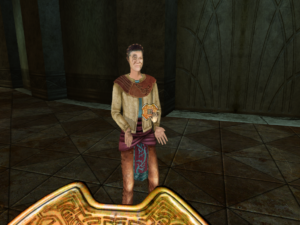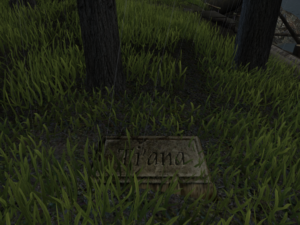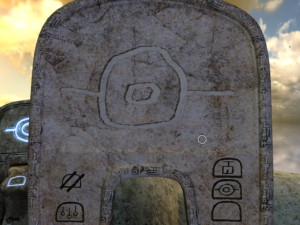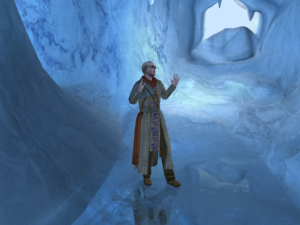Myst V: Endings
Esher is a fairly interesting character. He’s so desperate for the player’s approval! As the game progresses, it becomes clear that he’s basically a nazi, but he doesn’t see anything wrong with that, and he quite honestly doesn’t see any reason why you should see anything wrong with it. He really wants you to see his point of view, and is willing to help you out, explain things, justify himself — everything except stop being a nazi. Now, the stereotypical game bad guy is an apparently superior foe who does everything in his power to stop you, justifying everything you do in response. Esher isn’t like that: even though he’s a bad guy, he’s never an antagonist. This puts you in the somewhat uncomfortable position of passing judgment on someone who’s done you no wrong. It’s reminiscent of the encounter with Gehn in Riven, or even the encounter with Raymond Burr in Rear Window.
Unfortunately, the bad endings undercut this by having him turn against you once you’re no longer useful to him. Suddenly he’s more like Sirrus and Achenar than like Gehn. Let me go into more detail. Spoilers ho.
By the end, I pretty much knew what the big deal is with the Tablet. It has to do with the Bahro’s immense magical powers. The Bahro can control the weather. They can even control time. And the Tablet? It controls the Bahro. It’s the means by which they were enslaved. Clearly no one can be entrusted with this power. The Tablet should be thrown into the fires of Mount Doom, if you can find them.
 But the game didn’t seem to give me that choice. When I got the Tablet, I found myself back in D’ni with Yeesha, who held out her hands as if to receive the Tablet, just as Esher said she would. But in the beginning, Yeesha herself insisted that I should not give her the Tablet once I got it, and she wasn’t actually saying any different now. She wasn’t saying anything at all. Up to that point, I had been contemplating giving it to her despite her warning if it came down to a choice between her and Esher. But this? This was eerie. I wasn’t even sure it was really Yeesha. So I decided not to give it to her.
But the game didn’t seem to give me that choice. When I got the Tablet, I found myself back in D’ni with Yeesha, who held out her hands as if to receive the Tablet, just as Esher said she would. But in the beginning, Yeesha herself insisted that I should not give her the Tablet once I got it, and she wasn’t actually saying any different now. She wasn’t saying anything at all. Up to that point, I had been contemplating giving it to her despite her warning if it came down to a choice between her and Esher. But this? This was eerie. I wasn’t even sure it was really Yeesha. So I decided not to give it to her.
That left only one obvious option: taking it to Myst Island, where Esher said he’d meet me. This also seemed like the obvious thing to do because otherwise you don’t get to take a last look at Myst Island. Myst V starts in the room where the original Myst ended, so it seemed reasonable that it would end where Myst began. I had no idea what I’d do with the Tablet once I got there, but hoped some option would present itself. It didn’t. I ultimately put the Tablet in the holder waiting for it, just for lack of anything else to do with it, and Esher immediately appeared and started on his plans to re-enslave the Bahro and conquer the cosmos. The ingrate then marooned me there. I’m glad I went, though, because it gave me the opportunity to see Myst Island in its decrepit, overgrown state. There’s some excellent thunder and lightning effects there.
 One thing was of particular note on Myst Island: Ti’ana’s grave. “What?” you might say. “I don’t remember a grave in Myst.” That’s because Myst didn’t let you look at it. In Myst V, you can’t look at it if you’re using the “Classic” control mode, which seems to replicate the nodes from the original. You have to go into free-movement mode to see it. I tried to give the Tablet to Ti’ana, but no, she’s dead.
One thing was of particular note on Myst Island: Ti’ana’s grave. “What?” you might say. “I don’t remember a grave in Myst.” That’s because Myst didn’t let you look at it. In Myst V, you can’t look at it if you’re using the “Classic” control mode, which seems to replicate the nodes from the original. You have to go into free-movement mode to see it. I tried to give the Tablet to Ti’ana, but no, she’s dead.
I also tried leaving the Tablet alone and going to my rendezvous with Esher empty-handed. This presumably stopped him from re-establishing the D’ni reich, but it also left me stranded in the ruins of Myst with no way out.
I did eventually discover the correct ending, and unfortunately the final crucial realization was one about the user interface, not about the situation. The resolution is satisfying, but I’d have enjoyed it more if the characters didn’t talk so much. It’s not like they have much to say. Silence and loneliness were originally a large part of the mood of Myst, and the developers seem to have forgotten that.
 Comments(2)
Comments(2)

